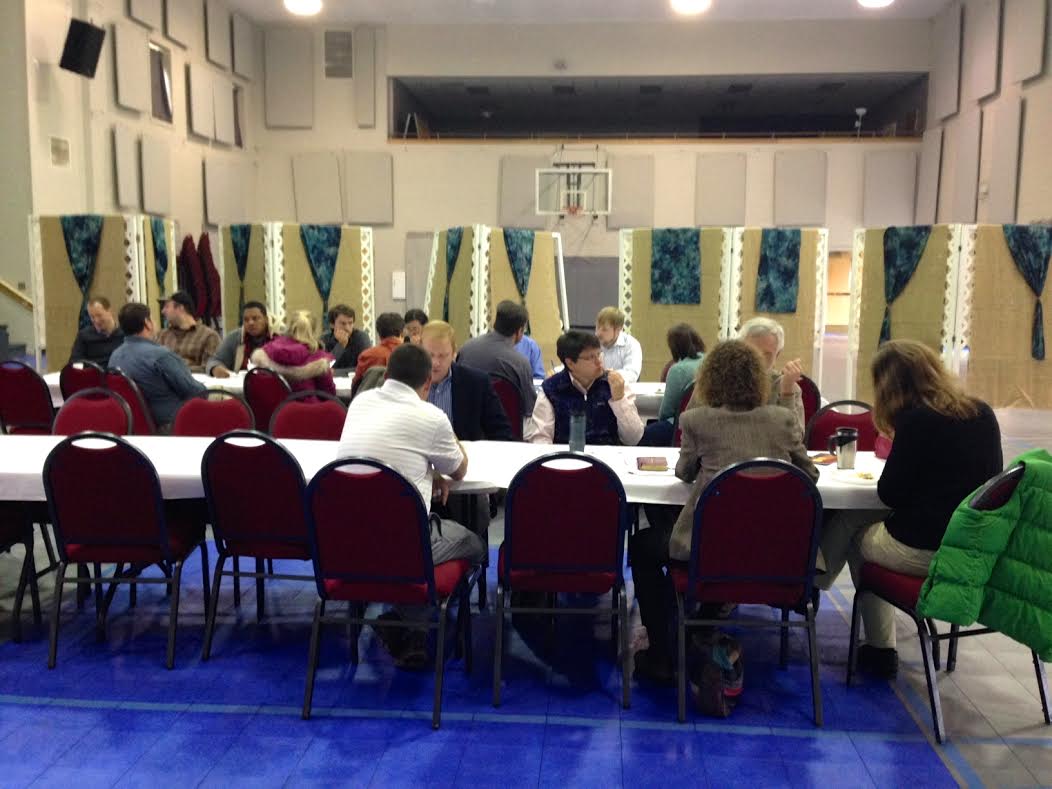The past two months the NC Coalition for Justice for Immigrants has been busy with its annual clergy breakfast series. This year we hosted five events across the state, as far west as Black Mountain and to the east toward Greenville. In total, 87 clergy and congregational leaders participated. I had the pleasure of attending all of the events and wanted to share a few lessons that I learned (or was reminded of) along the way:
1) North Carolina is a big state and each community is different. As I spent weeks driving from city to city, I realized that North Carolina is really big. And in this large expanse of land, there is also a great diversity among communities. In relation to my work, this diversity is visible in the services available for immigrants. In many cities, such as Greensboro or Charlotte, there is a central hub of services such as a Centro Latino. However, in some communities where their immigrant population is practically invisible, there exists nothing of the sort. This was the case in Boone, where we heard from the Latino Health Program, which is working to reach out to immigrants who need medical services but who are difficult to locate.
2) While church budgets vary greatly, the work of the Holy Spirit is present in each church. I am always amazed at the variety of churches I visit working with the Council. This year, we were in large churches (with large budgets and many staff people) and also very small churches that don’t have the staff to help organize events. This particularly stood out to me at Unidos Por Cristo UMC in Grimesland (a rural suburb of Greenville). The church was small and hadn’t been renovated in a very long time; however, the pastor was clearly busy working in a variety of capacities there. He spoke during the Clergy Breakfast about being the first person that people in his community come to when they need help, and it was evident to me that, despite his small building, he was doing huge work in his community.
3) Talking about immigration is frustrating. The sentiment that I heard most often voiced in the Clergy Breakfasts was frustration. Clergy want to be involved in their communities and want to do something but aren’t sure where to start. The truth is, it can be very difficult to build trust across racial lines, and our churches still remain segregated. This constantly makes me reevaluate our programs to try to find ways to make them more easily accessible.
4) Working together is the best way to accomplish change. A substantial part of the Clergy Breakfasts is devoted to networking. This is not in an effort to give presenters’ less time to talk, but rather because networking is just as important as the information that attendees receive. Involvement in any sort of social justice work can often be alienating, and more is accomplished when we work together. I feel as though a Clergy Breakfast has been a success when people exchange contact information so that they can continue these types of conversations.
5) Clergy love coffee….and bagels. Pretty self-explanatory.
6) Immigration is many-sided. This year we had a variety of presenters including health outreach workers, immigration attorneys, outreach coordinators from public schools, community organizers and Latino clergy. Each one talked about different ways that immigrants in their communities were affected by their status, from local situations in which parents are afraid to drive their children to school or to the hospital to global situations in which undocumented children and families are being held in detention facilities along the border. The presence of immigrants in our communities affects our own daily lives, which is evident if we just take the time to think about it.
7) Anti-immigrant sentiment is, unfortunately, alive and well, even in the church. I am always asked about the reception that I receive in churches. Overall, my interactions are positive; however, that is not always the case. This continues to be a divisive issue, and because the Clergy Breakfasts are an opportunity for pastors to express their concerns, some do express negative feelings about undocumented immigrants in their communities. While their anger and passion are understandable, we all need to have compassion and open hearts and minds when having difficult discussions (both within the church and outside of the church). While this type of anger saddens me, it reminds me that there is still work to be done. Prejudice, stereotypes and exclusion continue to exist within our churches.
8) There is never enough time to cover everything. The main negative feedback that I received from the Clergy Breakfasts is that there is not enough time for discussion. This is partly because the presenters often have so much information to share, and partly because these types of discussions are so complex. Which leads me to my next point….
9) There is no such thing as a dumb question when it comes to immigration. There is always someone who will preface a question, saying, “This is probably a stupid question, but….” The reality is that there are no stupid questions. Immigration is a complex issue and often the answers are not simple. The best thing is being able to ask questions in a safe space where no one will be judged.
10) God is with us. John Wesley said it first, but honestly, I felt the work of the Holy Spirit moving in the Clergy Breakfasts. As I saw people having honest discussions, learning, questioning, reflecting, and working together, I knew that we are working for the Kingdom. And those are the times when I give thanks to have a job where I can facilitate these meetings, but also I give thanks that God shows up as well.

